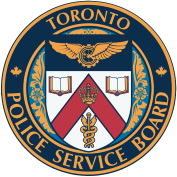
Accessibility Standards for Customer Service
|
DATE APPROVED |
December 17, 2009 |
Minute No: P339/09 |
|
DATE(S) AMENDED |
|
|
|
DATE REVIEWED |
|
|
|
REPORTING REQUIREMENT |
|
|
|
LEGISLATION |
Police Services Act, R.S.O. 1990, c.P.15, as amended, s. 31(1)(c). Accessibility for Ontarians with Disabilities Act, S.O. 2005, c. 11. |
|
|
DERIVATION |
|
|
The Toronto Police Services Board (the Board) is committed to meeting its obligations under the Accessibility for Ontarians with Disabilities Act, 2005 (“AODA”).
The AODA is a law passed by the Ontario legislature that allows the government to develop specific standards of accessibility and to enforce them.
The Ontario Government is issuing five sets of standards under the AODA to achieve the vision of a barrier-free Ontario by 2025. The first set is the “Accessibility Standards for Customer Service”, Ontario Regulation 429/07, which became law on January 1, 2008 and applies to the Board and the Toronto Police Service as of January 1, 2012.
The Regulation, Accessibility Standards for Customer Services, applies to every designated public sector organization and to every other person or organization that provides goods or services to members of the public or other third parties and that has at least one employee in Ontario. The Regulation states that every provider of goods or services will establish policies, practices and procedures governing the provision of its goods or services to persons with disabilities.
Providers must use reasonable efforts to ensure that the policies, procedures and practices they develop are consistent with the following principles:
- Dignity
- Independence
- Integration, except when alternate measures are necessary to meet the needs of people with disabilities
- Equal opportunity.
The definition of disability under the AODA is the same as that under the Ontario Human Rights Code.
Under that legislation, disability” means,
- any degree of physical disability, infirmity, malformation or disfigurement that is caused by bodily injury, birth defect or illness and, without limiting the generality of the foregoing, includes diabetes mellitus, epilepsy, a brain injury, any degree of paralysis, amputation, lack of physical co-ordination, blindness or visual impediment, deafness or hearing impediment, muteness or speech impediment, or physical reliance on a guide dog or other animal or on a wheelchair or other remedial appliance or device,
- a condition of mental impairment or a developmental disability,
- a learning disability, or a dysfunction in one or more of the processes involved in understanding or using symbols or spoken language,
- a mental disorder, or
- an injury or disability for which benefits were claimed or received under the insurance plan established under the Workplace Safety and Insurance Act, 1997.
It is the policy of the Toronto Police Services Board that:
- The Board will ensure that its Internet/Intranet sites and telephone system are accessible to people with disabilities, making technical modifications, where necessary, including building in the capacity for use of assistive devices;
- The Board will ensure, where reasonable, that publications printed by the Board be made available in alternate formats, upon request by people with disabilities;
- The Board will ensure its meetings and other meetings involving the public:
- be held at facilities that are physically accessible to people with disabilities; and
- have agendas and minutes that are accessible to people with disabilities.
- The Board will ensure its meetings and other meetings involving the public:
- be held at facilities that are physically accessible to people with disabilities; and
- have agendas and minutes that are accessible to people with disabilities.
- The Board will ensure the development of processes to deal specifically with accessibility in the following areas, as listed in the Regulation:
- Use of service animals and support persons;
- Notice of temporary disruptions;
- Training for staff;
- Feedback process;
- Notice of availability of documents; and
- Format of documents; and
It is further the policy of the Toronto Police Services Board that:
- The Chief of Police will develop procedures to ensure that Internet/Intranet sites and telephone system are accessible to people with disabilities, making technical modifications, where necessary, including building in the capacity for use of assistive devices;
- The Chief of Police will develop procedures to ensure, where reasonable, that publications printed by the Service be made available in alternate formats, upon request by people with disabilities;
- The Chief of Police will develop procedures to ensure that Service meetings involving the public:
- be held at facilities that are physically accessible to people with disabilities, and;
- have agendas and minutes that are accessible to people with disabilities.
- The Chief of Police will develop procedures to deal specifically with accessibility in the following areas, as listed in the Regulation:
- Use of service animals and support persons;
- Notice of temporary disruptions;
- Training for staff;
- Feedback process;
- Notice of availability of documents; and
- Format of documents; and
- The Chief of Police will ensure that all measures taken to ensure accessibility be consistent with the following principles: dignity, independence, integration (except where alternate measures are necessary to meet the needs of people with disabilities) and equal opportunity.